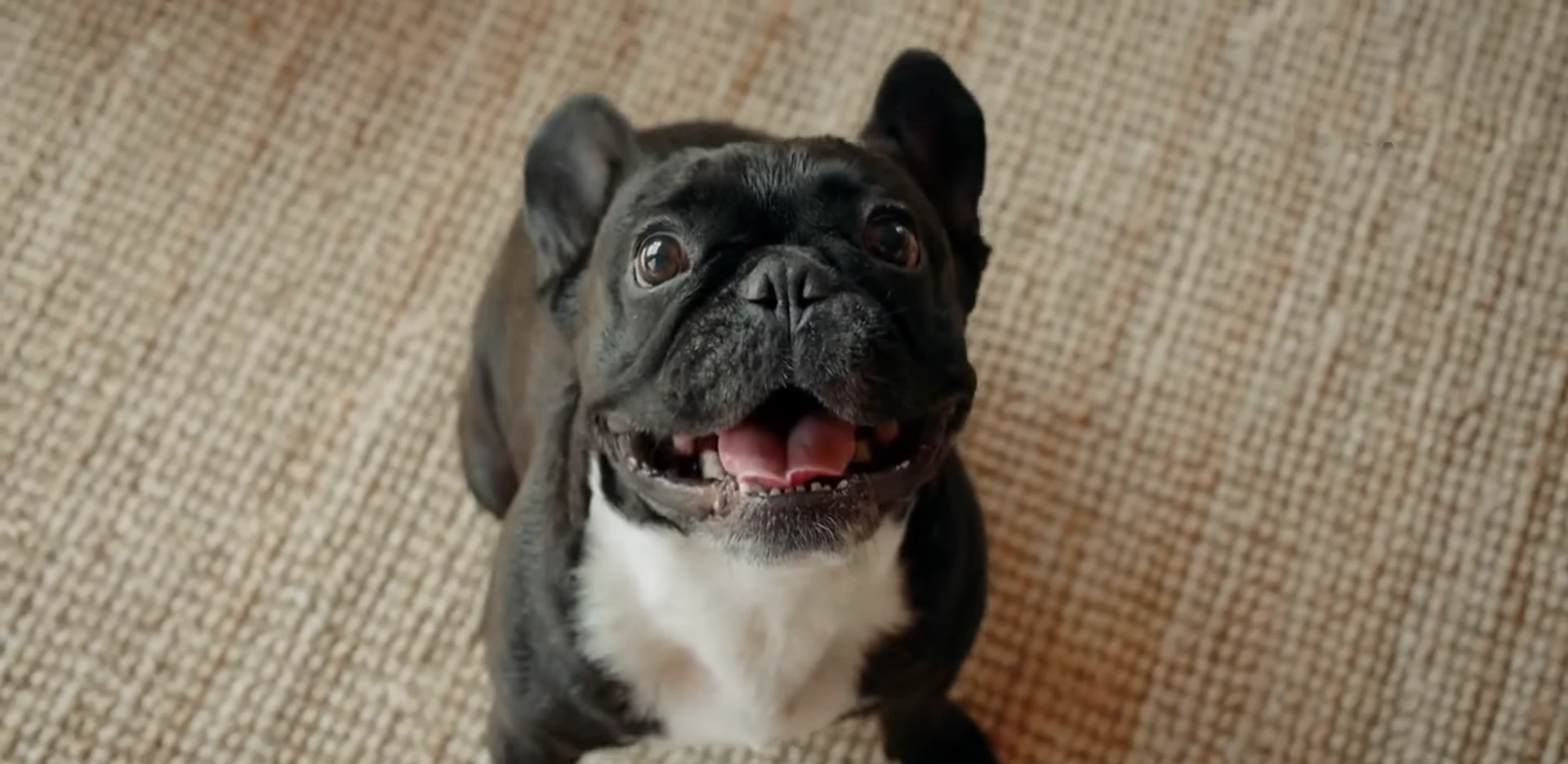Do Frenchies bark a lot ?

Understanding a dog’s means of communication often begins with their barking tendencies.
While some breeds readily express themselves through frequent barks, others exhibit a more reserved nature.
Among these breeds lies the French Bulldog, known for their distinctive traits. In this article, we delve into the world of French Bulldog barking habits to uncover the reasons behind their minimal vocalizations.

Why do some breeds bark less?
What sets French Bulldogs apart in their vocal behavior?
Are they suitable for apartment living due to their quieter demeanor?
Join us as we explore these questions and unravel the unique barking characteristics of French Bulldogs.
Why Do French Bulldogs Bark?
When your French bulldog puppy seems to bark incessantly, it might feel like they’re intentionally causing chaos. However, their barking isn’t meant to drive you crazy.
Similar to other dogs, French bulldogs bark instinctively. It’s their way of communicating needs and alerting you to potential threats, like strangers entering your home. Realistically, expecting perpetual silence from a Frenchie is unrealistic.
Yet, unwittingly, dog owners can exacerbate barking issues in French bulldogs.
How does this happen?
A barking French bulldog often seeks attention, food, walks, playtime, or security. When a dog owner consistently responds to this barking by granting these desires, the Frenchie learns to use barking as a tool.
What should you do if your Frenchie’s barking becomes unmanageable?
The first step involves identifying the trigger behind your French bulldog’s barking. Once you discern the root cause, you can address the barking issue accordingly.
Understanding French Bulldog Barking: Unveiling the Reasons Behind Their Vocal Expressions

-
Loneliness: French Bulldogs, known for their social nature, thrive on human interaction and care. When left alone for extended periods, they often experience anxiety, resulting in barking as a manifestation of their unhappiness. Expect potential neighbor complaints about French Bulldog howling and other noises when leaving your Frenchie alone. Explore effective solutions in “Are Bulldogs OK to be left Alone? Plus 5 Helpful Tips.”
-
Boredom: Frenchies might bark excessively due to boredom even when in your presence. Similar to humans, when lacking mental and physical stimulation, they resort to barking or engaging in mischievous behavior around the house.
-
Fear & Anxiety: Experts from The American College of Veterinary Behaviorists highlight that barking in French Bulldogs often signals angst and anxiety. Changes in their environment, such as moving homes or introducing new pets, can trigger fear-based barking. Exposing your Frenchie to various sounds from an early age can reduce fear-induced barking in the future.
-
Separation Anxiety: French Bulldogs tend to develop strong attachments, leading to distress when their preferred person is absent. Prolonged periods alone may lead to separation anxiety, accompanied by destructive behavior and excessive barking.
-
Territorial Behavior: Excessive barking when someone approaches your home indicates territorial behavior in French Bulldogs. While natural, inadequate socialization and home training can escalate this behavior into territorial bit or aggression .
Expanding upon these factors is crucial in understanding and managing French Bulldog barking tendencies for their well-being and a harmonious living environment
Effective Strategies to Reduce Excessive Barking in French Bulldogs

Numerous dog breeds communicate more vocally than others, prompting inquiries about French Bulldogs’ barking tendencies. Do Frenchies bark excessively or remain relatively quiet?
In brief, French Bulldogs do bark, albeit not excessively. Should you observe heightened barking in your Frenchie, employing proper training techniques coupled with patience can help diminish this behavior.
Here are seven tips to effectively minimize excessive barking in French Bulldogs:
-
Physical and Mental Stimulation: Ensure your Frenchie receives adequate physical and mental stimulation, particularly vital for managing French bulldog puppy barking. Interactive toys, games like fetch, and snuffle mats are excellent boredom-busting options.
-
Ignoring Attention-Seeking Behavior: Avoid reinforcing attention-seeking barking by ignoring your Frenchie when they bark for attention. Praise them when calm to reinforce quiet behavior.
-
Training: Teach commands like “quiet” and “speak” with positive reinforcement. Consistency is key to fostering understanding and compliance.
-
Counterconditioning: Address separation anxiety by associating your departure with positive experiences, such as offering treats. Consider crate training to ease their distress when alone.
-
Desensitizing Sensory Triggers: Gradually expose your Frenchie to triggering sounds, like thunderstorms, using desensitization techniques. Reward calm behavior during these sessions

- Health Issues: While dog barking primarily relates to behavior, it’s crucial to consider potential health concerns.Surprisingly, can French Bulldogs bark due to pain? Absolutely!Unusual French bulldog noises like barking, yelping, or whining might signify underlying medical issues such as pain, cognitive decline, or developing ailments.
Your Frenchie’s barking could be their way of communicating distress.
In case your French bulldog displays sudden and persistent barking, check for any tender spots and observe their reaction when touched.
Additionally, scheduling a vet appointment for a professional examination is advisable.
- Seek Professional Help: Is your French bulldog incessantly barking, causing disruption day and night? Persistent barking might pose a challenge, particularly if you share close quarters with neighbors or if it indicates health or anxiety issues.
Should the earlier strategies prove ineffective, enlisting the assistance of a professional trainer or pet behaviorist becomes a viable option to address persistent barking.
French bulldogs typically possess amiable temperaments and aren’t known for excessive barking. However, when faced with such behavior, a professional dog behaviorist can accurately diagnose the root cause of the barking issues and propose effective solutions for your beloved Frenchie.
Why Doesn’t My French Bulldog Bark?

When you bring a dog into your home, barking is typically part of their natural behavior. However, occasionally, you might hear someone mention, ‘My French bulldog doesn’t bark much. Is this a cause for concern?’
In truth, it’s likely not a concern at all.
French Bulldogs are recognized for their relatively quiet demeanor. Bred primarily as companions, they are content to sit by your side, offering companionship, rather than being vigilant in guarding your home against every sound.
In contrast to some smaller breeds known for their high-pitched, incessant barking, French Bulldogs are not constant barkers. They vocalize when necessary rather than continuously.”
When do Frenchies start Barking?

Why Do French Bulldogs Howl?
Howling serves as a method of communication among dogs, distinct from their primary form of vocalization, barking.
While barking conveys a range of emotions from happiness to fear or agitation, howling harkens back to dogs’ ancestral instincts. For instance, feral dogs and wolves would howl to signal their pack’s location.
But do Frenchies engage in howling?
French bulldogs do howl, yet their howling differs notably from other breeds.
A Frenchie’s howl tends to be high-pitched, often resembling a unique blend of singing and, at times, even sounding like a form of shrieking. This distinct howl is influenced by their brachycephalic nature, affecting their breathing.
Various triggers can prompt a French bulldog’s howling. They may howl to call you back, mark their territory to other dogs, convey anxiety, alert their owner, seek attention, or respond to stimuli like musical instruments or emergency sirens. When left alone, a Frenchie’s howl may signify feelings of loneliness.
Although not a common behavior among Frenchies, howling can be contagious. Your French Bulldog might join in howling in response to another nearby howling dog
What other Frenchies owners says on reddit and scoial media :
We adopted a toy poodle, Lily, that had been rescued from a puppy mill. She was used as a breeder for the first two years of her life. She didn’t make a sound for months and we started to think the a-holes at the puppy mill had removed her voice box! But one night my husband went to bed early and Lily went too. Hubs had random, loud fart that scared Lily up and off the bed and she hasn’t stopped barking since.
I have three frenchies and one is EXTREMELY vocal. We hear his beautiful voice daily lol. The second one only barks when the first one barks. And the third one, who is the youngest, sounds like an actual pig but never barks. Even when the other two are losing it, he just sits there and gives them side eye. I think it depends on the personality and anxiety level and I def don’t see it as an issue
Mine doesn’t bark I believe they are really smart when he was little he used to make noise and I’d shushed him and he’d stop now he doesn’t make any noise he’s 3 now just got him a baby brother he was really vocal and the same thing actually he’s learning things from the older one funny thing I’ve been dealing with lately is the 4 month old will be in his kennel and the older one goes over and unlocks it for him I want to correct it but it’s to dam cute
You can continue reading what other people says in Reddit here.
Frequently Asked Questions (FAQs)
-
Are French Bulldogs generally known for excessive barking?
No, French Bulldogs are not typically regarded as excessive barkers. They tend to vocalize less compared to many other breeds.
-
At what age do French Bulldog puppies start barking?
French Bulldog puppies begin vocalizing around 2-3 weeks of age, with their barking typically emerging more noticeably around 17-18 weeks.
-
Can French Bulldogs howl?
Yes, French Bulldogs can howl, although their howling differs from other breeds due to their unique high-pitched, sometimes singing-like vocalizations.
-
What triggers French Bulldogs to bark or howl?
A: Various reasons prompt French Bulldogs to bark or howl, including territorial instincts, seeking attention, expressing anxiety, alerting their owner, or reacting to specific stimuli like sirens or musical sounds.
-
How can I minimize excessive barking in my French Bulldog?
Providing adequate physical and mental stimulation, using training techniques like positive reinforcement, addressing potential health concerns, and seeking professional help if needed are effective ways to manage excessive barking in French Bulldogs.
-
Do French Bulldogs bark when left alone?
Some French Bulldogs may bark when feeling lonely or anxious due to separation, but not all exhibit this behavior when left alone. Training, desensitization, and counterconditioning can help alleviate such issues.
-
Can French Bulldog barking be controlled or reduced?
Yes, with consistent training, positive reinforcement methods, and understanding triggers that prompt barking, it is possible to control and reduce excessive barking in French Bulldogs. Professional guidance might be sought if the behavior persists despite efforts.

You may also be interessed in :
why are french bulldogs jealous
6 REASONS WHY YOU SHOULD NEUTER YOUR FRENCHIE
How To Stop French Bit Bulldog Behavior




